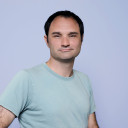The 2023 Richard Deswarte Prize in Digital History is awarded to Gábor Mihály Tóth (C²DH), lead author of the article ‘Studying Large-Scale Behavioral Differences in Auschwitz-Birkenau with Simulation of Gendered Narratives’, Digital Humanities Quarterly 16:3 (2022), co-written by Tim Hempel (Microsoft Research / Freie Universität Berlin, Department of Mathematics and Physics), Krishna Somandepalli (Google Research), and Shri Narayanan (University of Southern California, Viterbi School of Engineering).
The award-winning paper investigates more than 6000 oral history interviews with survivors of Auschwitz-Birkenau; it applies methods of molecular physics and provides evidence that solidarity and social cohesion were stronger among women than among men in Auschwitz.
The judging panel recognised the paper’s contribution to historical knowledge, historiography, and method. Peter Webster, chair of the panel, said:
This article sparked a very lively and wide-ranging conversation among the panel. We noted the article’s combination of methodological sophistication with a definite and novel intervention in the historiography of the period. This is a striking piece of work, situated at the intersection of digital method, oral history and the study of the Holocaust, and the panel’s reflections on it suggest that it is sure to foster lively debate about the interactions between those fields, as well as within each one. In its second year, it is a pleasure to see the Deswarte Prize once again highlighting the strength, diversity and liveliness of the field; Richard would, I feel sure, have been delighted by it.
This annual prize, established in the memory of Richard Deswarte, and attributed by the Institute of Historical Research (IHR), University of London, rewards the best papers on digital history internationally. Richard Deswarte (1965-2021) was one of the founding convenors of the Digital History seminar at the Institute of Historical Research (IHR), University of London, an advocate for the value and importance of digital history, and an irreplaceable member of the community of digital historians in the UK and beyond.
Gábor Mihály Tóth joined the C²DH in 2023. His current research focuses on the application of scientific models in historical research. At the C²DH he coordinates a new digital monograph series and supports Andreas Fickers in the newly established Deep History doctoral program.



